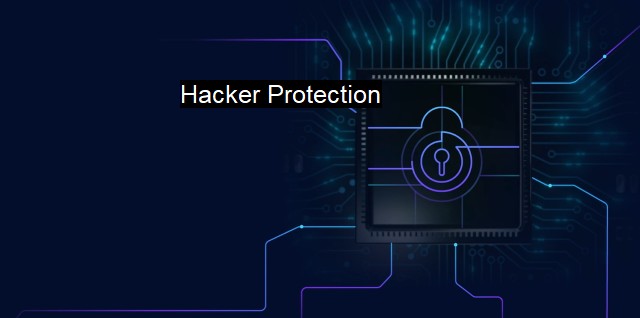What is Hacker Protection?
The Importance of Hacker Protection in Today's Cybersecurity Landscape: Breaking Down the Basics of Antivirus and Beyond
"Hacker Protection" is an essential aspect in the realm of cybersecurity designed to safeguard systems, networks, and programs from digital attacks. With cyber threats becoming a prominent concern across various sectors, it has become critically apparent that standard protection alone is not enough. Reports suggest that hacking attacks occur every 39 seconds globally, emphasizing the dire need for substantial hacker protection measures to ward off these cyberattacks. the concept of hacker protection encompasses techniques that effectively detect, prevent, and respond to possible threats and attacks that can compromise digital security and cause colossal damage.In hacker protection, cybersecurity holds the most substantial significance due to its convergence and interaction with other technicalsegments such as artificial intelligence, antivirus, biometrics, and internet of things (IoT). the most fundamental domain of hacker protection remains the antivirus software.
Antivirus software serves as the primary line of defense against cyber threats, laying the basic tenets of hacker protection. It detects and eliminates broad-spectrum malicious software known as malware, essentially designed to damage or infiltrate a computer system without the direct knowledge of the administrator. From curbing viruses, worms, trojans, ransomware, and spyware on systems and networks to protecting against phishing attacks and malicious URLs, antivirus software continually evolves, utterly crucial for hacker security initiatives.
Antivirus includes a combination of practices, technologies, and strategies incorporated to identify malware and viruses intended to breach the defenses. Real-time scanning, systematic scans, suspicious behavior monitoring, and sandboxing are some techniques that comprise an antivirus. By performing these monitoring activities throughout the network, antiviruses seek out potential threats, thereby maintaining systemic health and privacy.
While the antivirus software focuses on protecting against malware threats, cybersecurity broadens this range of protection, encompassing prevention strategies aimed at the larger digital environments. In addition to combating viruses and malware, cybersecurity also concentrates on securing data from hackers, introducing essential measures to maintain system integrity.
A component of hacker protection strategy under cybersecurity encompasses identifying a possible cyberattack, strengthening system vulnerabilities to prevent an intrusion, spotting a hacking attack, taking requisite measures against it, checking for potential flaws, and rectifying the vulnerabilities. This methodical response offers an encompassing protective shield towards monitoring, locating, and eliminating risks.
Firewalls form an integral part of many cybersecurity plans. Primarily, they serve as an intermediary system between a safe network and an insecure network environment that restricts unauthorized access based on pre-established security rules. By doing so, it effectively blocks potential hackers from gaining access to a protected network.
In linking cybersecurity with antivirus software, multi-factor authentication (MFA) and artificial intelligence (AI) emerge as influential tools in hacker protection. MFA, with its added layers of security besides passwords, renders it daunting for hackers to breach, favoring secure network systems. AI. on the other hand, augments cybersecurity by learning to recognize potential attacks by observing patterns and adapting its defenses, thus fortifying further line of defense.
Education and awareness concerning cyber threats form an often-overlooked aspect of hacker protection strategy. Simple cautionary measures like familiarization with common forms of cyberattacks, updating software often, using strong cybersecurity software, and users being cautious of suspicious emails or links can be incredibly effective against attacks.
Hacker protection is a wide arena with numerous components ranging from cybersecurity methods to antivirus structures. These technical areas are combined to form a robust defense strut designed to ward off hacking threats. While there exist multiple ways for unauthorized intrusion into secure systems, hacker protection also continually evolves using advanced stage technology and artificial intelligence, thereby reducing the potential threats while advocating for tight data privacy regulations.

Hacker Protection FAQs
What is hacker protection and why is it important?
Hacker protection is a set of security measures designed to prevent malicious attackers from gaining unauthorized access to computer systems or networks. It is important because hackers can cause significant damage, steal sensitive data, and disrupt business operations.What are some common methods of hacker protection?
Common methods of hacker protection include antivirus software, firewalls, intrusion detection systems, multi-factor authentication, and encryption. These tools work together to identify and block potential threats, as well as protect sensitive data from unauthorized access.What should I look for in a good antivirus program?
When selecting an antivirus program, it is important to consider factors such as its effectiveness in detecting and removing malware, its ease of use, the frequency of updates, and its impact on system performance. It is also a good idea to look for programs that include additional features such as firewalls and phishing protection.How can I stay vigilant against hackers?
To stay vigilant against hackers, it is important to keep your software up-to-date, use strong passwords, avoid clicking on suspicious links or downloading unknown attachments, and enable two-factor authentication whenever possible. It is also wise to regularly back up important data and monitor your accounts for any unusual activity.| | A | | | B | | | C | | | D | | | E | | | F | | | G | | | H | | | I | | | J | | | K | | | L | | | M | |
| | N | | | O | | | P | | | Q | | | R | | | S | | | T | | | U | | | V | | | W | | | X | | | Y | | | Z | |
| | 1 | | | 2 | | | 3 | | | 4 | | | 7 | | | 8 | | |||||||